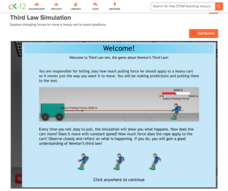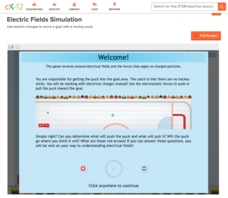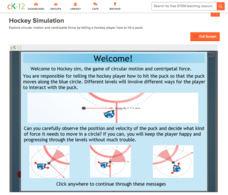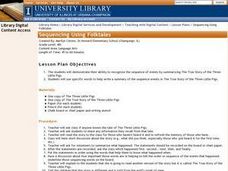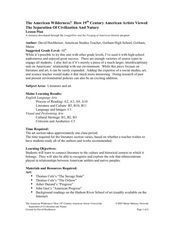CK-12 Foundation
Free Body Simulation
To show the magnitude and direction of all forces acting upon an object, scientists use a free body diagram. This simulation serves as an introduction to free body diagrams allowing scholars to build their own. Pupils select the proper...
CK-12 Foundation
Third Law Simulation
Keep calm and use the force! Joey pulls a cart and scholars adjust the force required to control the movement. Through simulating different scenarios, participants learn about Newton's Third Law. It includes analysis questions throughout...
CK-12 Foundation
Energy Conservation Simulation
Does the amount of a roller coaster's energy change as it goes along the track? Scholars investigate when a roller coaster has potential and kinetic energy. They observe the changes as it goes up the initial hill follows it throughout...
CK-12 Foundation
Electric Ice Sheet
Tommy is trapped on an ice bridge and needs you to balance the charges so he doesn't fall into the icy water! Scholars apply Coulomb's Law, which relates to both the strength and the distance between charges. They work with these two...
CK-12 Foundation
Electric Fields Simulation
Can you get the puck into the goal using only electric charges on the ice? Scholars experiment with electrostatic forces as they determine which charges pull the puck and which repel it. Multiple levels reinforce different related...
CK-12 Foundation
Cannon Simulation
Fire in the hole! Thrill your classes as they see what it's like to fire a cannon ball. Scholars practice aiming a cannon ball by altering first the firing angle, then the velocity, and finally both simultaneously. Can they discover the...
CK-12 Foundation
Hockey Simulation
Do you understand the science behind hitting a hockey puck to control the direction it moves? Pupils experiment by telling a hockey player how to hit the puck so it moves in a circular direction. Through manipulating the velocity and...
CK-12 Foundation
Oscillations Simulation
What makes a swing go back and forth like a pendulum rather than going all the way around? Scholars use the simulation to explore pendulums and how they work. They vary the weight, length of the rope, and even gravity in various trials.
CK-12 Foundation
Power and Efficiency Simulation
How much energy in Jewels does it take to tow a car up a slope? Scholars explore different values of both kinetic and potential energy to answer that question. Through multiple levels, the difficulty increases — as does your young...
CK-12 Foundation
Capacitor Simulation
The camera flash works based on a simple circuit, but why does it require a capacitor? Scholars work through two levels of simulations related to circuits and capacitors. The pupils first use a simple circuit with a battery,...
CK-12 Foundation
Resistor Simulation
Many scholars struggle to picture electrons traveling in a circuit but understand water going through a pipe. The simulation compares circuits to water pipes. It walks pupils through four levels of questions, allowing them to switch...
Curriculum Corner
February Bell Ringers
Use a set of 30 writing bell ringers to get through the month of February. Writers tap into and write about how February makes them feel, what it smells like, and all types of celebrations that occur during the month.
Serendip
How Do We Sense the Flavors of Food?
We taste with our taste buds, so why do flavors change when we have a stuffy nose? Scholars experiment with taste testing while holding their noses and then while smelling. They record their observations in pairs and come together to...
Curated OER
What's Inside My Computer?
Pupils draw a picture of what they think a computer looks like inside. They learn the function of each part of a computer, the definitions of unfamiliar computer terms, and complete a worksheet of definitions of computer parts.
Curated OER
Draw an Inch, Walk a Mile
Students work in small groups to solve the problems presented. The main project, mapping the classroom, use these discussions to collaborate in creating a tangible demonstration of their understanding.
Curated OER
The Very Hungry Caterpillar
Here is a good activity on butterflies and caterpillars. After listening to The Very Hungry Caterpillar, young learners put cards that depict the life cycle of a butterfly in the correct order. There are some good ideas for center...
Curated OER
Whose Point of View? The Journey of Three Generations
A reading of Whale Journey, a fact-filled picture book by Vivian French, launches a study of the life cycle and migration of three generations of gray whales. The interdisciplinary lesson plan offers opportunities extensions into all...
Curated OER
Compare Two Versions: Folk Tales, Sequencing, and Summary
Compare two versions of "The Three Little Pigs" (traditional and Jon Scieszka's The True Story of the Three Little Pigs, told from the wolf's point of view). As your 4th graders recount the familiar version of the story, emphasize the...
Curated OER
How Was the White House Designed?
Students examine how the initial design of the White House was chosen. They analyze various designs, explore websites, list the characteristics of each design and compare them, and answer discussion questions.
Curated OER
A President's Home and the President's House
Students examine the differences between the White House and Monticello. In small groups, they complete a virtual tour, complete a graphic organizer, take notes during the tour, and identify activities taking place at the White House.
Curated OER
African-American Soldiers in World War I: The 92nd and 93rd Divisions
Young scholars research the role played and contributions made by African American soldiers during World War I. They discuss the evolution of civil rights in America's history, and the progress that has been made in the last 100 years.
Curated OER
Sodbusters!
Students study American settlers, how and where they lived by observing images. They investigate how the settlers used sod to build houses that were adaptable to the plains environment. They compare living in a sod homes with their home.
Curated OER
On Sunday There Might Be Americans Lesson
Young scholars examine the life of a rural Niger boy. They discover his relationship with foreigners and indigenous peoples. They read excerpts from a former Peace Corps volunteer.
Curated OER
The American Wilderness? How 19th Century American Artists Viewed the Separation of Civilization and Nature
The attitudes of European settlers toward the American wilderness, as reflected in art and literature, is the focus of this resource packet designed for teachers. Included in the unit overview you will find lists or paintings and...
Other popular searches
- 4th Grade Memory Book
- A Christmas Memory
- Memory Game
- Great Depression Memory Book
- Circus Animals Memory Game
- Printable Memory Game
- Concentration Memory Game
- Memory Books
- Memory Neuroscience
- Psychology Memory
- Computer Memory
- Critical Thinking Memory

